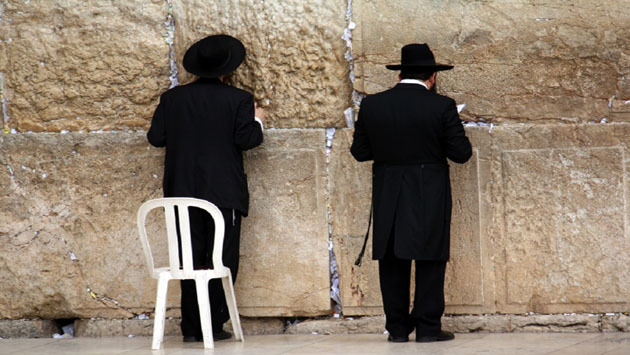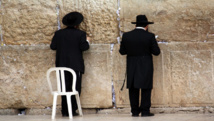His visit to Holy Land - capped by a staunchly pro-Israel speech on Monday that was laced with biblical imagery - has not quelled Palestinian anger.
Palestinian officials, outraged at Trump's Jerusalem move, boycotted Pence and Palestinian businesses and institutions closed on Tuesday in protest.
Wearing a black Jewish skullcap, or kippah, Pence approached the Western Wall and lowered his head along with his wife, Karen, who stood in the holy site's woman's section.
No Israeli officials accompanied the vice president to the holy site, which is located in territory annexed by Israel and claimed by Palestinians for their future state.
Pence is the first senior US official to visit the contested city since Trump's December 6 announcement sparked weeks of Palestinian protests and international condemnation.
No members of the US administration have had contact with the Palestinian Authority leadership since December 6, a White House official said Tuesday, but the White House had been in contact with Palestinians.
The official also said no event or summit had been planned during which Trump and Abbas could meet.
"There is no planned summit, but we are here," the official said, "ready, willing and able to engage in dialogue with President Abbas, with his team, at any particular time."
During his visit Pence forcefully reiterated Washington's position on Jerusalem, adding that the US embassy would move from Tel Aviv to Jerusalem by the end of 2019, ahead of previous estimates.
He also called on the Palestinians to enter peace negotiations with the Israelis, and said the US will no longer certify the nuclear deal between Iran and the world community if the agreement is not "fixed."
"President Trump has directed our State Department, working with Ambassador [David] Friedman to complete the transition of moving our embassy here to Jerusalem by the end of next year," Pence said at the start of a meeting with Israeli President Reuven Rivlin in Jerusalem.
"And we look forward to that as a tangible sign of our enduring commitment and alliance to the state of Israel and to the people of this great nation," he remarked.
Pence added that Trump's Jerusalem move "set the table for the opportunity to move forward in meaningful negotiations to achieve a lasting peace and end the decades-long conflict."
Palestinian President Mahmoud Abbas has shunned any idea of removing Jerusalem from Israeli-Palestinian peace negotiations and said the US is now disqualified from its role as the main mediator between the two sides.
Israeli Prime Minister Benjamin Netanyahu, meanwhile, showered Pence and Trump with praise.
"No other American vice president has had a greater commitment to Israel and its people," Netanyahu said in a speech before the Knesset on Monday, addressing Pence in English as "my good friend Mike."
On Tuesday a united front of all Palestinian factions called for the strike in the West Bank and East Jerusalem in response to Pence's visit and Washington's move to recognize Jerusalem as Israel's capital.
Palestinian schools were also closed in the West Bank and East Jerusalem, but businesses in the Hamas-controlled Gaza Strip remained open.
Trump's televised declaration, which included a promise to move the US embassy, upended decades of US policy towards the divided holy city.
Israel claims Jerusalem as its undivided capital, while the Palestinians want East Jerusalem as the capital of their future state.
In the 1967 Arab-Israeli War, Israel occupied the eastern half of Jerusalem, now home to over 300,000 Palestinians, and later annexed the territory in a move that was not internationally recognized.
Palestinian officials, outraged at Trump's Jerusalem move, boycotted Pence and Palestinian businesses and institutions closed on Tuesday in protest.
Wearing a black Jewish skullcap, or kippah, Pence approached the Western Wall and lowered his head along with his wife, Karen, who stood in the holy site's woman's section.
No Israeli officials accompanied the vice president to the holy site, which is located in territory annexed by Israel and claimed by Palestinians for their future state.
Pence is the first senior US official to visit the contested city since Trump's December 6 announcement sparked weeks of Palestinian protests and international condemnation.
No members of the US administration have had contact with the Palestinian Authority leadership since December 6, a White House official said Tuesday, but the White House had been in contact with Palestinians.
The official also said no event or summit had been planned during which Trump and Abbas could meet.
"There is no planned summit, but we are here," the official said, "ready, willing and able to engage in dialogue with President Abbas, with his team, at any particular time."
During his visit Pence forcefully reiterated Washington's position on Jerusalem, adding that the US embassy would move from Tel Aviv to Jerusalem by the end of 2019, ahead of previous estimates.
He also called on the Palestinians to enter peace negotiations with the Israelis, and said the US will no longer certify the nuclear deal between Iran and the world community if the agreement is not "fixed."
"President Trump has directed our State Department, working with Ambassador [David] Friedman to complete the transition of moving our embassy here to Jerusalem by the end of next year," Pence said at the start of a meeting with Israeli President Reuven Rivlin in Jerusalem.
"And we look forward to that as a tangible sign of our enduring commitment and alliance to the state of Israel and to the people of this great nation," he remarked.
Pence added that Trump's Jerusalem move "set the table for the opportunity to move forward in meaningful negotiations to achieve a lasting peace and end the decades-long conflict."
Palestinian President Mahmoud Abbas has shunned any idea of removing Jerusalem from Israeli-Palestinian peace negotiations and said the US is now disqualified from its role as the main mediator between the two sides.
Israeli Prime Minister Benjamin Netanyahu, meanwhile, showered Pence and Trump with praise.
"No other American vice president has had a greater commitment to Israel and its people," Netanyahu said in a speech before the Knesset on Monday, addressing Pence in English as "my good friend Mike."
On Tuesday a united front of all Palestinian factions called for the strike in the West Bank and East Jerusalem in response to Pence's visit and Washington's move to recognize Jerusalem as Israel's capital.
Palestinian schools were also closed in the West Bank and East Jerusalem, but businesses in the Hamas-controlled Gaza Strip remained open.
Trump's televised declaration, which included a promise to move the US embassy, upended decades of US policy towards the divided holy city.
Israel claims Jerusalem as its undivided capital, while the Palestinians want East Jerusalem as the capital of their future state.
In the 1967 Arab-Israeli War, Israel occupied the eastern half of Jerusalem, now home to over 300,000 Palestinians, and later annexed the territory in a move that was not internationally recognized.









 Home
Home Politics
Politics











